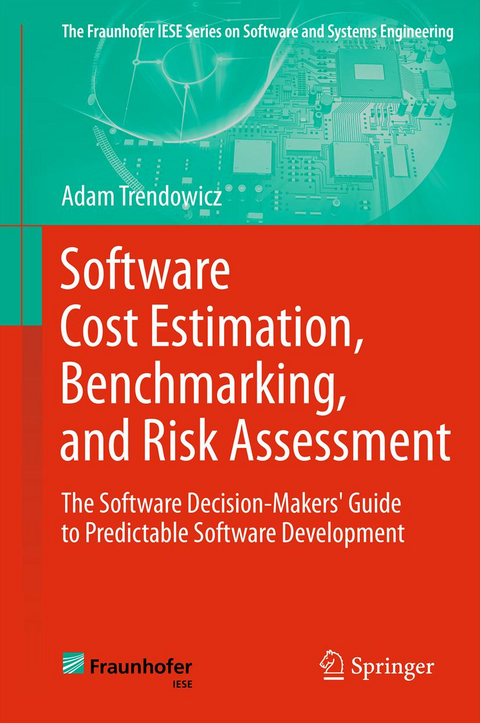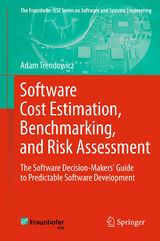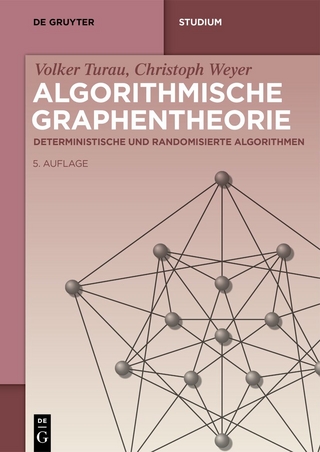Software Cost Estimation, Benchmarking, and Risk Assessment
Springer Berlin (Verlag)
978-3-642-30763-8 (ISBN)
Software effort estimation is a key element of software project planning and management. Yet, in industrial practice, the important role of effort estimation is often underestimated and/or misunderstood.
In this book, Adam Trendowicz presents the CoBRA method (an abbreviation for Cost Estimation, Benchmarking, and Risk Assessment) for estimating the effort required to successfully complete a software development project, which uniquely combines human judgment and measurement data in order to systematically create a custom-specific effort estimation model. CoBRA goes far beyond simply predicting the development effort; it supports project decision-makers in negotiating the project scope, managing project risks, benchmarking productivity, and directing improvement activities. To illustrate the method's practical use, the book reports several real-world cases where CoBRA was applied in various industrial contexts. These cases represent different estimation contexts in terms of software project environment, estimation objectives, and estimation constraints.
This book is the result of a successful collaboration between the process management division of Fraunhofer IESE and many software companies in the field of software engineering technology transfer. It mainly addresses software practitioners who deal with planning and managing software development projects as part of their daily work, and is also of interest for students or courses specializing in software engineering or software project management.
Adam Trendowicz is a senior consultant at the Fraunhofer Institute for Experimental Software Engineering (IESE) in Kaiserslautern, Germany. He has led software cost estimation and software measurement improvement activities in software companies of different sizes and from various domains (e.g., in Germany, Japan, and India), and he has been involved in functional software size estimation (Function Points Analysis) and productivity benchmarking in organizations from both the industry and the public sector. His research interests include measurement-based controlling of software products and processes, software quality modeling and evaluation, and technology validation by means of empirical methods.
Part I Predictable Software Development.-Why Software Effort Estimation?.- What is a Good Estimate?.- Why the CoBRA Method?.- Part II The CoBRA Method.- Principles of the CoBRA Method.- Model Development and Validation.- Model Application.- Usage Scenarios of a CoBRA Model.- Part III Industrial Applications.- Software design & management, Germany.- Allette Systems, Australia.- Oki Electric, Japan.- Siemens Information Systems, India.- Japan Manned Space Systems, Japan.- Bibliography.
From the reviews:
"The scope of the book is the cost estimation, benchmarking, and risk assessment (CoBRA) method, launched in 1998. ... The author thoroughly explains the basics and presents real practical cases throughout the book, in a way that any metrics engineer will be able to understand. Readers who finish the book will be able to set up a CoBRA method easily." (Jair Merlo, Computing Reviews, September, 2013)
"The CoBRA method is a way of integrating the "Art" and the "Science" of software estimation, which is usually believed to be a "Black Art". The CoBRA method demystifies the Black Art of software estimation." Yasushi Ishigai, Research Director at Research Center for Information Technology, Mitsubishi Research Institute, Inc., Japan
"We had not been able to imagine building our own software estimation models until we encountered the CoBRA method. As far as combining project data and expert judgment for the purpose of software effort estimation is concerned, we can definitely say that there are no other methods that are comparable to CoBRA." Morihiko Shinoda, Deputy Department Manager, Yutaka Masaoka, Senior Engineer, Government, Public Sector Systems Division, Hitachi Solutions, Ltd., Japan
"We used the CoBRA method for early-stage estimation of system integration projects. We were very satisfied with CoBRA because we could easily model relevant cost drivers that are specific to our own context as well as base development productivity. From limited use in one group, we have now expanded its use to department-wide activities." Yasushi Aizaki, Manager at Systems Development Division, NTT Data Sekisui Systems, Japan
"I am convinced that the CoBRA method has a high potential of resolving "acquisition issues" related to the accountability of software costs in IT business, which enduringly persist on the side of IT customers. That's because the models arevery simple and easy to build and can be understood even by non-IT professionals." Hiroshi Iwakiri, General Manager, Information Systems Business Unit, Mitsubishi Electric Corporation
"We had not been able to imagine building our own software estimation models until we encountered the CoBRA method. As far as combining project data and expert judgment for the purpose of software effort estimation is concerned, we can definitely say that there are no other methods that are comparable to CoBRA." Morihiko Shinoda, Deputy Department Manager, Yutaka Masaoka, Senior Engineer, Government, Public Sector Systems Division, Hitachi Solutions, Ltd., Japan
"We used the CoBRA method for early-stage estimation of system integration projects. We were very satisfied with CoBRA because we could easily model relevant cost drivers that are specific to our own context as well as base development productivity. From limited use in one group, we have now expanded its use to department-wide activities." Yasushi Aizaki, Manager at Systems Development Division, NTT Data Sekisui Systems, Japan
"I am convinced that the CoBRA method has a high potential of resolving "acquisition issues" related to the accountability of software costs in IT business, which enduringly persist on the side of IT customers. That's because the models are very simple and easy to build and can be understood even by non-IT professionals." Hiroshi Iwakiri, General Manager, Information Systems Business Unit, Mitsubishi Electric Corporation
From the reviews:“The scope of the book is the cost estimation, benchmarking, and risk assessment (CoBRA) method, launched in 1998. … The author thoroughly explains the basics and presents real practical cases throughout the book, in a way that any metrics engineer will be able to understand. Readers who finish the book will be able to set up a CoBRA method easily.” (Jair Merlo, Computing Reviews, September, 2013)“The CoBRA method is a way of integrating the "Art" and the "Science" of software estimation, which is usually believed to be a "Black Art". The CoBRA method demystifies the Black Art of software estimation.” Yasushi Ishigai, Research Director at Research Center for Information Technology, Mitsubishi Research Institute, Inc., Japan“We had not been able to imagine building our own software estimation models until we encountered the CoBRA method. As far as combining project data and expert judgment for the purpose of software effort estimation is concerned, we can definitely say that there are no other methods that are comparable to CoBRA.” Morihiko Shinoda, Deputy Department Manager, Yutaka Masaoka, Senior Engineer, Government, Public Sector Systems Division, Hitachi Solutions, Ltd., Japan“We used the CoBRA method for early-stage estimation of system integration projects. We were very satisfied with CoBRA because we could easily model relevant cost drivers that are specific to our own context as well as base development productivity. From limited use in one group, we have now expanded its use to department-wide activities.” Yasushi Aizaki, Manager at Systems Development Division, NTT Data Sekisui Systems, Japan“I am convinced that the CoBRA method has a high potential of resolving "acquisition issues" related to the accountability of software costs in IT business, which enduringly persist on the side of IT customers. That's because the models arevery simple and easy to build and can be understood even by non-IT professionals.” Hiroshi Iwakiri, General Manager, Information Systems Business Unit, Mitsubishi Electric Corporation“We had not been able to imagine building our own software estimation models until we encountered the CoBRA method. As far as combining project data and expert judgment for the purpose of software effort estimation is concerned, we can definitely say that there are no other methods that are comparable to CoBRA.” Morihiko Shinoda, Deputy Department Manager, Yutaka Masaoka, Senior Engineer, Government, Public Sector Systems Division, Hitachi Solutions, Ltd., Japan“We used the CoBRA method for early-stage estimation of system integration projects. We were very satisfied with CoBRA because we could easily model relevant cost drivers that are specific to our own context as well as base development productivity. From limited use in one group, we have now expanded its use to department-wide activities.” Yasushi Aizaki, Manager at Systems Development Division, NTT Data Sekisui Systems, Japan“I am convinced that the CoBRA method has a high potential of resolving "acquisition issues" related to the accountability of software costs in IT business, which enduringly persist on the side of IT customers. That's because the models are very simple and easy to build and can be understood even by non-IT professionals.” Hiroshi Iwakiri, General Manager, Information Systems Business Unit, Mitsubishi Electric Corporation
| Erscheint lt. Verlag | 20.12.2012 |
|---|---|
| Reihe/Serie | The Fraunhofer IESE Series on Software and Systems Engineering |
| Zusatzinfo | XXVI, 322 p. |
| Verlagsort | Berlin |
| Sprache | englisch |
| Maße | 155 x 235 mm |
| Gewicht | 684 g |
| Themenwelt | Mathematik / Informatik ► Informatik ► Software Entwicklung |
| Mathematik / Informatik ► Mathematik ► Finanz- / Wirtschaftsmathematik | |
| Wirtschaft ► Betriebswirtschaft / Management ► Projektmanagement | |
| Schlagworte | CoBRA method • software cost estimation • Software Effort Estimation • Software engineering • software measurement • Software Project Management • Software Risk Management |
| ISBN-10 | 3-642-30763-9 / 3642307639 |
| ISBN-13 | 978-3-642-30763-8 / 9783642307638 |
| Zustand | Neuware |
| Haben Sie eine Frage zum Produkt? |
aus dem Bereich




